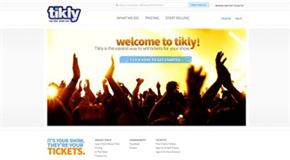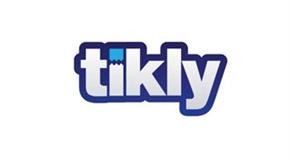Features
Selling Tickets The Tikly Way
Peterson. who is also the tour manager for The Nadas, was scoping out SXSW when we caught up with her last week. While riding in a pedicab through the streets of Austin, Texas, Peterson, discussed how Tikly a better way for artists to sell tickets to fan club members and how improving the concert experience is her passion.

Let’s start with the basics. What is Tikly?
Tikly is the artist-focused, fan-friendly ticketing solution that I built with a whole lotta love and integrity. We kicked it off April 13, 2011 in the name of providing my band that I tour managed, called The Nadas, with a good ticketing solution that would make our fans feel better about buying tickets in advance.
There was a real issue that I faced on a regular basis. The Nadas have 20 years of community built around what they do. These other ticketing companies, the agencies that we worked with because a venue was contractually obligated to them, they just weren’t doing us any good. They were misrepresenting us. They were taking advantage of our fans. It just broke my heart when fans would ask, “Why would I buy my tickets in advance? They cost $5 more to buy in advance than at the door.”
That’s a real issue. It became, after my first year on the road with The Nadas, something that you couldn’t look the other way on it. I knew it was an issue for ticket buyers who have to buy tickets through Ticketmaster, Ticketfly, what have you. It wasn’t a positive experience. But if it’s not a positive experience for the ticket seller, either, than there has to be a better solution. I searched high and low for that solution and when I couldn’t find it, we went ahead and built it.
I am the founder and CEO. We have about 500 sign-ups at this point with 28 states represented on the system in four different countries. It’s so incredibly cool to watch the ways that artists, venue owners and event organizers are using our system to have a better direct-to-fan relationship. They’re clients, these people are entrepreneurs and their fans are their clients and I’m very honored that Tikly can provide them with a solution that’s worth their while.
When does Tikly enter the picture? When the tour is being routed or after the venues have already been booked?
In the process of booking a tour and everything, the best way to approach using Tikly is definitely to have it as part of your plan from the beginning. We recommend artists include in their booking agreements that they have the right to sell a certain amount of tickets. This isn’t a foreign concept. … It’s the artist agreement, fan club ticketing in its purest form. It provides the fans with early access to tickets, perhaps, but it provides them with lower fees, the ability to buy merchandise and things like that.
Traditionally, the best way to approach it is to say, “I’m going on tour. I’m going to sell tickets directly to my fans. So if I play the Bluebird Theatre in Denver, Colo., I’m going to sell 10 percent of the venue’s capacity directly to my fans, no questions about it.”
That being said, there are always opportunities, retroactively, to go back to a venue or a talent buyer and ask for the opportunity to sell tickets. We have plenty of people who do it. But it’s best to plan ahead. At least, that’s how my mom raised me to think.

You’re talking about fan clubs and ticket allotments for bands to sell directly to fans, but what about the casual buyer? Can the average consumer, someone who is not a member of a fan club, buy tickets through Tikly?
They can buy tickets. If there are still tickets available through the Tikly solution for that artist, then they can go to the Tikly website and search for that artist. It’s very, very easy to get access. We have the Tikly marketplace that is searchable at any given time and can provide you with information based on location, artist name, and venue.
The cool thing is this: My passion – I’m very open and honest about the fact that my passion is definitely with the touring musician and the smaller, mid-size venue owner. But these venue owners, they’re bringing Tikly into their database practices as well. So, how cool is it when we have a Tikly venue and an artist selling their tickets through Tikly as well? It puts the entire experience back in control of the people who put on the show at every angle. Then, when you’re casually glancing through the newspaper, you might see, instead of Ticketfly, you very well might see Tikly associated with where you should go to buy.
An event in downtown Des Moines – a St. Patrick’s Day celebration – they put some money into radio promotions throughout the Iowa area. And it’s very fun for me to hear their radio ads because at the end of it they say, “Go buy your tickets at the venue’s website.” They don’t even have to say go buy your tickets at “X, Y, or Z ticketing company” or “you have to go to Tikly to buy your tickets.” We integrate so seamlessly with the branding, people and venues we work with, that we encourage them to say, “Go to my website, go to my Facebook page. Go and engage with me because they’re my tickets and I’m selling them but I’m using Tikly to accomplish this task.”
How does Tikly make money?
As of now, what we do, and there are a couple of reasons behind this, is we have a completely transparent and reliable fee structure. Our fee structure is very straightforward. … I really want this not to be complicated. I don’t want a band in a tour bus in the middle of nowhere with limited access to the Internet to have to work through the algebra associated with fee structures that might exist even with other companies like Eventbrite where you do have to add 1 plus 2 plus 3 percent kind of stuff across the board.
What we do is for a ticket of $10 or less, we have a one-dollar service fee associated. For $75 or more we have a service fee of $7.50. For a ticket anywhere in between those two points – $10 and $75 – we have a 10 percent service fee.
Can you walk us through an example? Say, a road manager wants to use Tikly for one show?
You go to Tikly.co, sign up. It takes about 25 seconds. Then, once you’re in, you can go and take a look at the sample event we show you. Then you create your new event. It’s very, very simple, maybe five required steps and the rest of it is optional. Beyond that we let you diversify and brand your page as much as you want. It could be in just the simple Tikly blue background with the straightforward … with the descriptions and the ticket boxes. Or you can upload a background image, description image, fill your media box with album artwork and CD release, and all of it. Truth be told, it takes about five to ten minutes to do all of that.
One of my favorite initial clients is a venue called Vaudeville Mews in Des Moines, Iowa. … I remember after we got them set up with everything, the venue owner said, “I think this would be fun. Let’s have a race to see who can go from completely start to having an event set up.”
And we had a race. Not to brag, I did get an event completely from non-existing to set up with all of the images and merchandise you’ll ever need, in maybe a minute. But my buddy here who’s their talent buyer, doesn’t really do the computer thing as much as I do. And he had an entire event set up from non-existing to tickets live for sale, branded in the name of the venue he was representing, in less than three minutes. It’s just that easy. I really want to make it that easy so that way, people feel comfortable adding more and more [events]. This doesn’t have to be a one-off thing. The thing I admire most is when it becomes a real tool in how you conduct your business.
There’s an artist by the name of Bess Rogers. She performs with Ingrid Michaelson. … She keeps adding more and more events. And she’s done everything from house concerts to venues to planning churches and things on Tikly. She doesn’t even have to reach out to me at this point to get any advice or help.
How are you spreading the Tikly gospel to bands and venues that might not be aware of your existence? That is, other than talking to the press?
We go where they are. I am a tour manager going on three years of being on the road. I have a band and a label I work for that has been in business for most of my life. I’m 23 and they’ve been around for almost 20 years. They have an incredible network for me to initially tap into and learn from. We go to conferences, host showcases and we throw parties and we book bands. … We go to Folk Alliance and host a room there, bring in 15 artists. [We] partner with different venues Right now [at SXSW] we’re partnering with one of the first labels we ever signed on to Tikly, called the Vinefield Agency, in support of what we’re calling down here, The Music Party.
How many people does Tikly employ?
We have a roster of individuals. It’s a unique thing because we’re still in the start-up phase. We don’t have any official employees. I was the original founder and am the CEO. I also have Bryan Hemesath, who built the software you see at Tikly.co today. He’s sort of a CTO. In a lot of ways he found himself taking on the role of co-founder. It’s really a small team. We are surrounded with a fantastic advisory board based out of technology companies. We have Charise Flynn of Dwolla, she’s their COO. She plays a part in the project management of the business and allows me access to her brain and her vast experiences in the start-up world and otherwise.
We work with a lot of industry experts. Jason Walsmith from The Nadas has been there since day one for me and has really helped be our key into the industry, beyond what I could accomplish. It’s a small team but a mighty one. The great thing is all of us are so motivated out of passion. As cheesy as it sounds, and I almost hate to say it, but it really is about the music, right? It’s really is all about the culture and the community built around live events, whether you be a comedian, a venue owner or a touring musician.

Click here for Tikly’s website.